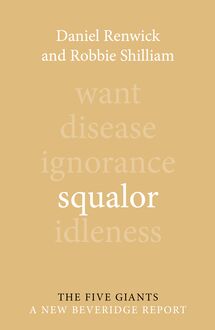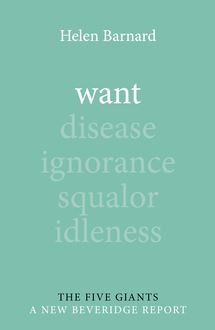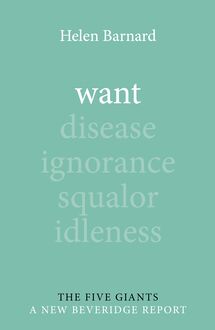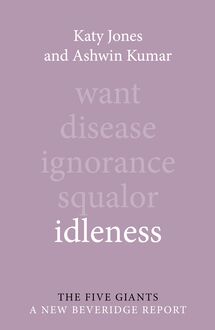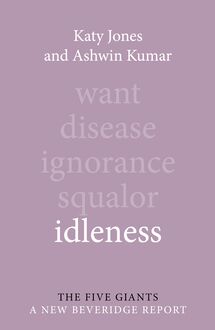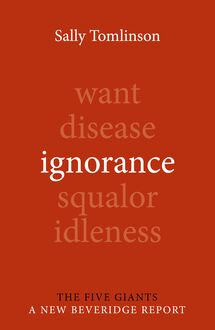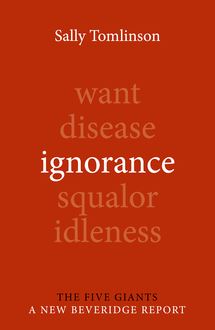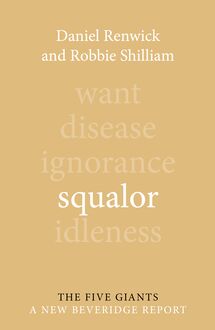-
 Univers
Univers
-
 Ebooks
Ebooks
-
 Livres audio
Livres audio
-
 Presse
Presse
-
 Podcasts
Podcasts
-
 BD
BD
-
 Documents
Documents
-
- Cours
- Révisions
- Ressources pédagogiques
- Sciences de l’éducation
- Manuels scolaires
- Langues
- Travaux de classe
- Annales de BEP
- Etudes supérieures
- Maternelle et primaire
- Fiches de lecture
- Orientation scolaire
- Méthodologie
- Corrigés de devoir
- Annales d’examens et concours
- Annales du bac
- Annales du brevet
- Rapports de stage
La lecture à portée de main
Vous pourrez modifier la taille du texte de cet ouvrage
Découvre YouScribe en t'inscrivant gratuitement
Je m'inscrisDécouvre YouScribe en t'inscrivant gratuitement
Je m'inscrisEn savoir plus
Vous pourrez modifier la taille du texte de cet ouvrage
En savoir plus

Description
British society is increasingly divided into the haves and the have-nots. Housing epitomizes this division with spiralling rents, exorbitant prices, lack of council provision, poorly maintained stock, and polluted cities with ever decreasing green space. Daniel Renwick and Robbie Shilliam provide a recent history of squalor culminating in the Grenfell Tower fire. In doing so they reveal a profound political failure to provide fair and just solutions to shelter – the most basic of human needs. Renwick and Shilliam argue that agents of change exist within those populations presently damned by a racist and class-riven system of housing provision.
Introduction
1. A moral history of squalor
2. Housing policy and national reform
3. A postwar consensus?
4. Demolishing slums, building up
5. The struggle for the city
6. The right to buy
7. Organized negligence
8. Twenty-first-century squalor
9. Social murder
Sujets
Informations
| Publié par | Agenda Publishing |
| Date de parution | 20 octobre 2022 |
| Nombre de lectures | 0 |
| EAN13 | 9781788213905 |
| Langue | English |
Informations légales : prix de location à la page 0,1250€. Cette information est donnée uniquement à titre indicatif conformément à la législation en vigueur.
Extrait
SQUALOR
“In this compelling history of squalor’s political and racial construction, Renwick and Shilliam debunk right-wing attempts to cast today’s squalid living conditions forced on many across the UK as a matter of morality and show them to be one of mortality. This is perhaps most poignantly exposed in their discussion of the Grenfell Fire, a touchpoint throughout the book. A truly significant contribution to the contemporary rethinking of one of Beveridge’s five impediments to social progress.”
GURMINDER BHAMBRA, Professor of Postcolonial and Decolonial Studies, University of Sussex
“A gripping read, Squalor powerfully describes the long-term historical processes that have shaped deprivation in our time. Left me feeling madly angry.” ARUN KUNDNANI, author of The Muslims are Coming! Islamophobia, Extremism, and the Domestic War on Terror
“ Squalor is a beautifully-written collaboration unified by the authors’ clear commitment to acknowledging, documenting and detailing the organized and in many cases, purposeful negligence of Britain’s working classes. But its key achievement is its engagement with a particular aspect of political education that focuses on the evolution of regulations, which plainly demonstrate that housing, or the right to a dignified life in one’s home, should be the ultimate unifier of the polity. This is a book which illuminates exactly why everyone should be paying attention to the politics of housing.”
CHANTELLE JESSICA LEWIS, Pembroke College, University of Oxford
“This brilliant work treads the trajectory of spatial arrangement in granular detail, and skillfully dispels several key myths along the journey. It concretizes the macro decisions, taken at the highest levels of political office, that have continually reordered the nitty-gritty micro level of day-to-day life across the century. This is an indispensable resource in the attritional war for the human right to safe and secure housing.”
LOWKEY, hip hop artist and journalist
FIVE GIANTS: A NEW BEVERIDGE REPORT
Consultant editor: Danny Dorling, University of Oxford
In November 1942, William Beveridge published Social Insurance and Allied Services , the result of a survey work commissioned the year before by the wartime coalition government. In what soon became known as simply “The Beveridge Report”, five impediments to social progress were identified: the giants of Want, Disease, Squalor, Ignorance and Idleness. Tackling these giants was to be at the heart of postwar reconstruction. The welfare state, including national insurance, child allowances and the National Health Service, was a direct result of Beveridge’s recommendations.
To mark the eightieth anniversary of the Report’s publication, the authors in this series consider the progress made against Beveridge’s giants, and whether they have diminished or risen up to again stalk the land. They also reflect on how the fight against poverty, unfit housing, ill-health, unemployment and poor education could be renewed as the countries of the UK emerge from a series of deeply damaging, divisive and impoverishing crises.
As an establishment figure, a Liberal and a eugenicist, Beveridge was an unlikely coordinator of the radical changes that improved so many peoples’ lives. However, the banking crisis at the end of the 1920s, the mass unemployment and impoverishment of the 1930s, and the economic shock of the Second World War changed what was possible to what became essential. Old certainties were swept aside as much from within the existing order as from outside it.
The books explore the topic without constraint and the results are informative, entertaining and concerning. They aim to ignite a broader debate about the future of our society and encourage the vision and aspiration that previous generations held for us.
Want by Helen Barnard
Disease by Frances Darlington-Pollock
Squalor by Daniel Renwick and Robbie Shilliam
Ignorance by Sally Tomlinson
Idleness by Katy Jones and Ashwin Kumar
© Daniel Renwick and Robbie Shilliam 2022
This book is copyright under the Berne Convention.
No reproduction without permission.
All rights reserved.
First published in 2022 by Agenda Publishing
Agenda Publishing Limited
The Core
Bath Lane
Newcastle Helix
Newcastle upon Tyne
NE4 5TF
www.agendapub.com
ISBN 978-1-78821-388-2
ISBN 978-1-78821-389-9 (ePDF)
ISBN 978-1-78821-390-5 (ePUB)
British Library Cataloguing-in-Publication Data
A catalogue record for this book is available from the British Library
Typeset in Nocturne by Patty Rennie
Printed and bound in the UK by CPI Group (UK) Ltd, Croydon, CR0 4YY
Contents
Acknowledgements
1 . Introduction
2 . A moral history of squalor
3 . Housing policy and national reform
4 . A postwar consensus?
5 . Demolishing slums, building up
6 . The struggle for the city
7 . The right to buy
8 . Organized negligence
9 . Twenty-first century squalor
10 . Social murder
References
Index
Acknowledgements
This book could not have been written without the support of many individuals, authors and campaigns that we stood on the shoulders of in seeking our vantage points. We are forever grateful for the tireless activism of Grenfell United and the North Kensington community. Their fight for meaningful truth, justice and accountability is a constant source of motivation. Huge thanks also have to go to Kareem Dennis (Lowkey), Brenna Bhandar and Peter Apps who read and advised on early drafts of the book. The invaluable wisdom of Colin Prescod can also be traced, along with the legacy of the work of the Institute of Race Relations. Many thanks to Maryam Nahhal for editorial work. Thanks also to Alison Howson for invaluable editorial advice. Any mistakes or wrongful articulations are entirely ours.
Daniel Renwick Robbie Shilliam
1
Introduction
Squalor simply defined: your habitat kills you. Squalor is inextricably bound to mortality and ever-increasing proximity to death caused by overcrowded quarters, damp abodes, polluted streets, and even petroleum-clad buildings. Some of these conditions are recognizably squalid and conjure conventional images of the poor and destitute. But some might surprise. For instance, consider the possibility that young professionals who stretch their budget to mortgage a leasehold in dangerously built apartment complexes are suffering from squalor. We know this giant from a hundred different books and films. We might not appreciate just how closely it stalks many of us.
Within squalor it is possible to find Beveridge’s other giants gestating – want, disease, ignorance and idleness. Yet squalor is distinct in so far as it is the only giant that does not directly reference human faculties or needs. Squalor, instead, is a condition of the built environment in which humans live. Etymologically, squalor derives from the Latin squalidus , meaning, “to be covered with dirt”. Squalor, then, intonates a covering over and defiling of humanity. The word has also come to imply a kind of osmosis between humans and their lived environment. Where the human ends and their habitat begins is unclear. For this reason, “good” homes and streets equals worthy humans, whereas “bad” homes and streets equals unworthy denizens.
The aim of this book is to provide a political history of squalor in Britain from the mid-nineteenth century to the present day. We are not interested in a past that is dead. Rather, we hope to provide a “history of the present”, that is, a history that helps to illuminate contemporary challenges. Crucial questions that will guide this illumination include: what elements of squalor persist over time, and how are they part of the bedrock of British politics? How has squalor changed its form? What should we name as squalor in our present day? And, when it comes to slaying the giant of squalor, what are the forces of continuity and who are the agents of change?
The objective of this book is to demonstrate that squalor in Britain has been consistently re-made by political elites, even as they have pursued policies to ameliorate squalid conditions. This is not to claim that squalor is simply an intentional project. Rather, we argue that diverse strategies such as slum clearance, new town building, social housing provision, and buying incentives have all rested on a fatal flaw: those who live in squalor have been judged to be part of the dysgenic environment themselves – they are a part of squalor, rather than sufferers of squalid conditions.
Underpinning this judgement lies a moralizing discourse that blames the poor for not having the strength of character to replace the attitudes that reproduce squalor: licentiousness, recklessness and fecklessness. One logic of this discourse is to abandon and quarantine those denizens who, living in squalor, threaten to exert a dysgenic influence on society by spreading dependency, criminality and disorder. Another logic embraces a social uplift directed by patricians and targeted at humans who demonstrate they have the strength of character to extract themselves from a squalid fate.
Additionally, we argue that this moralizing pathology regularly racializes those living in squalor as less-than – or degeneratively – human. Even before postwar Commonwealth immigration, and even excepting Irish migrants, the poor in nineteenth-century English cities were considered a “residuum” – a substance left behind, apart from the Anglo-Saxon race. This sense of being residual to society was oftentimes heightened with analogies to colonial subjects, even for residents of London’s docklands. Of course, such racialization was far more direct and unforgiving when it was later targeted at South Asian, African Caribbean, African and Middle Eastern residents. That said, poor white families have continued to be subtly racialized as an underclass.
When it comes to squalor, race and class are co-implicated. This factor is consequential to our analysis. Re/de-valuing
-
 Univers
Univers
-
 Ebooks
Ebooks
-
 Livres audio
Livres audio
-
 Presse
Presse
-
 Podcasts
Podcasts
-
 BD
BD
-
 Documents
Documents
-
Jeunesse
-
Littérature
-
Ressources professionnelles
-
Santé et bien-être
-
Savoirs
-
Education
-
Loisirs et hobbies
-
Art, musique et cinéma
-
Actualité et débat de société
-
Jeunesse
-
Littérature
-
Ressources professionnelles
-
Santé et bien-être
-
Savoirs
-
Education
-
Loisirs et hobbies
-
Art, musique et cinéma
-
Actualité et débat de société
-
Actualités
-
Lifestyle
-
Presse jeunesse
-
Presse professionnelle
-
Pratique
-
Presse sportive
-
Presse internationale
-
Culture & Médias
-
Action et Aventures
-
Science-fiction et Fantasy
-
Société
-
Jeunesse
-
Littérature
-
Ressources professionnelles
-
Santé et bien-être
-
Savoirs
-
Education
-
Loisirs et hobbies
-
Art, musique et cinéma
-
Actualité et débat de société
- Cours
- Révisions
- Ressources pédagogiques
- Sciences de l’éducation
- Manuels scolaires
- Langues
- Travaux de classe
- Annales de BEP
- Etudes supérieures
- Maternelle et primaire
- Fiches de lecture
- Orientation scolaire
- Méthodologie
- Corrigés de devoir
- Annales d’examens et concours
- Annales du bac
- Annales du brevet
- Rapports de stage

